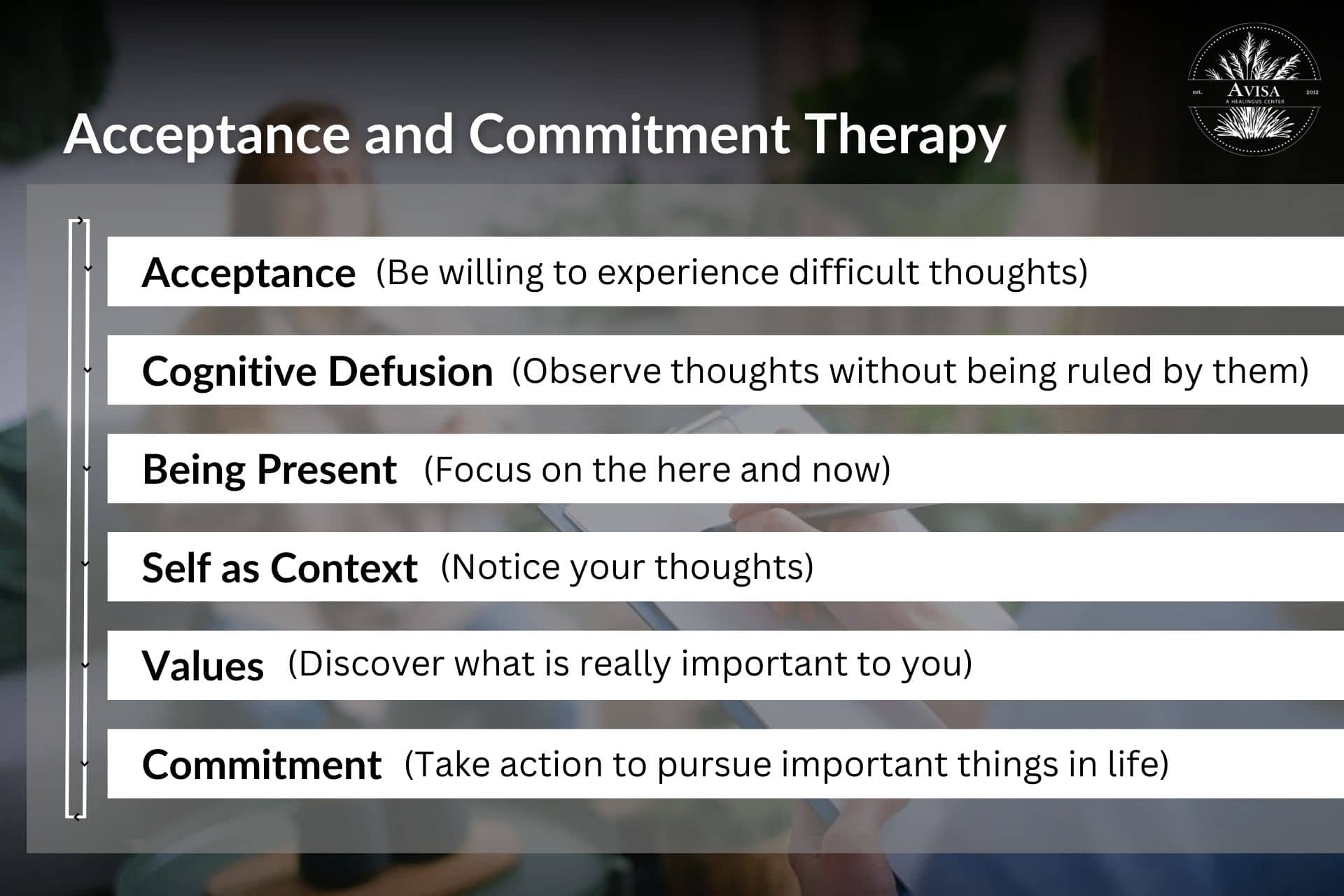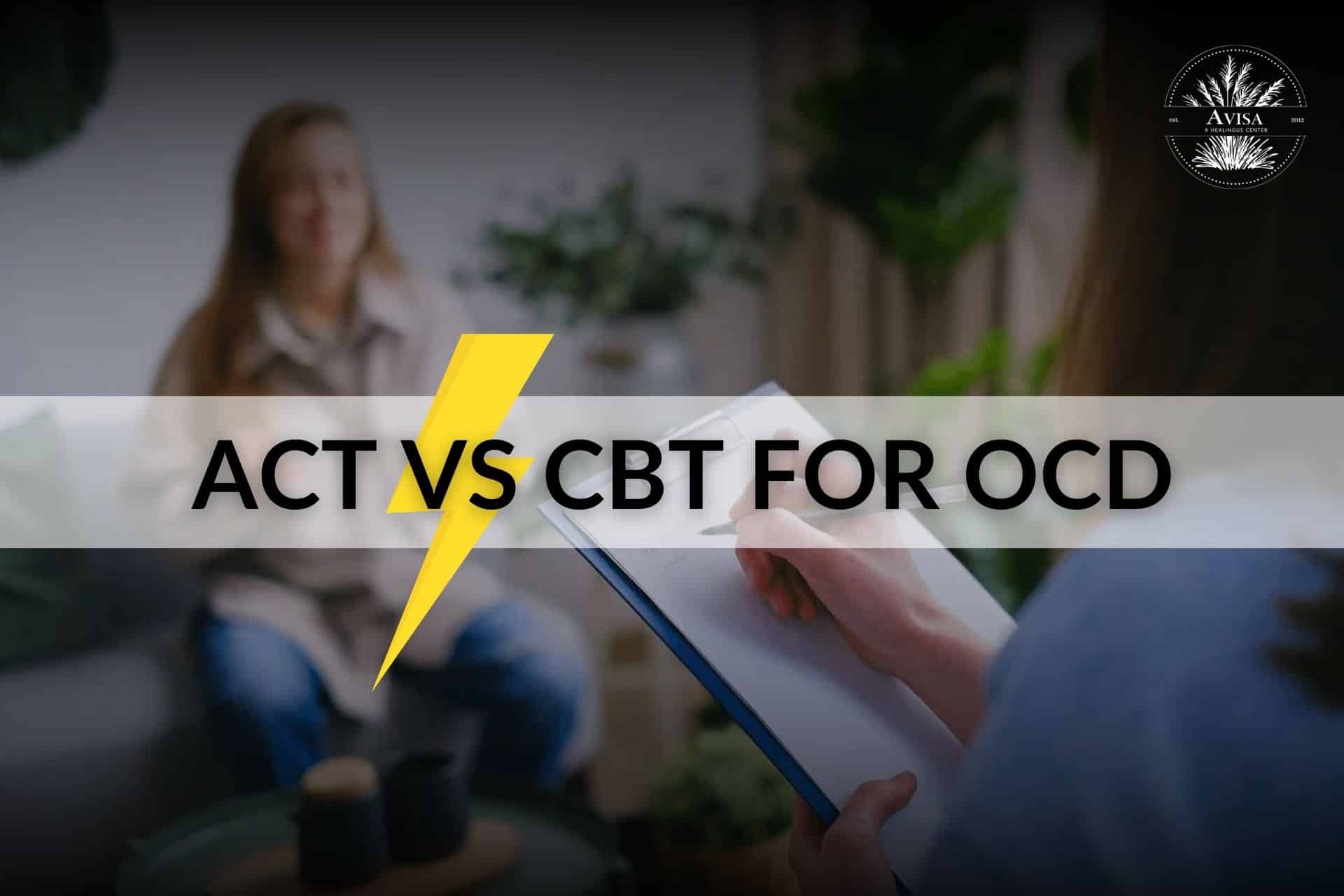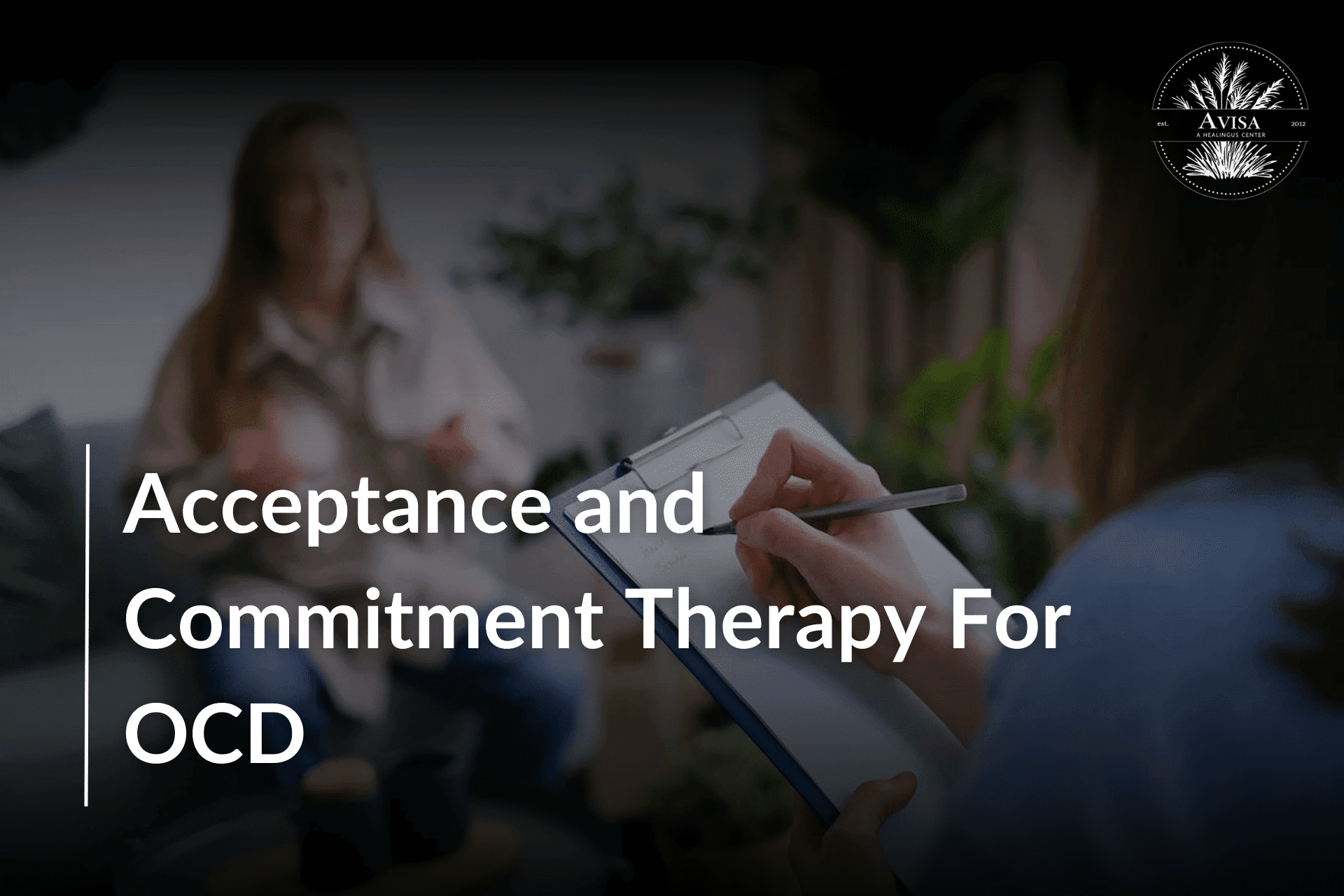“30-40% of patients with obsessive-compulsive disorder do not respond to traditional therapy, and those who do respond, often continue to experience residual symptoms of OCD.”. What if you could put yourself back in the driver’s seat? You can feel more empowered with Acceptance and commitment therapy for OCD.
Obsessive thoughts and compulsive rituals, we know how much they can take over and ruin the quality of life. The endless cycle of anxiety and temporary relief can feel inescapable. Before you know it, OCD has taken the wheel and your hopes and dreams are stuck in the backseat.
There comes an ACT, that gives you skills to view those worrying thoughts differently, accept them, and still move ahead with what’s important to you. Instead of struggling against OCD, you can make room for it and cut back its control. ACT helps you do what matters – your values – while being flexible with anxiety.
This blog post will explain how Acceptance and commitment therapy for OCD works and how it stacks up to traditional therapy. We’ll look at the evidence on using Acceptance and commitment therapy for OCD to supplement other treatments. You’ll also learn why this acceptance-based angle could give your OCD management a helpful boost.
What is Acceptance and Commitment Therapy (ACT)?

Acceptance and Commitment Therapy (ACT) represents a counseling approach centered on embracing challenging thoughts and emotions, rather than attempting to alter or resist them. When applied to Obsessive-Compulsive Disorder (OCD), ACT aims to foster flexibility, enabling individuals to engage in meaningful actions despite experiencing obsessions or compulsions.
In ACT, patients develop skills to observe their thoughts with less judgment, comprehend the reasons behind their avoidance behaviors, and commit to behaviors aligned with their values. By viewing internal experiences, such as obsessive thoughts, as transient occurrences requiring minimal reaction, individuals can liberate themselves from the constraints of OCD’s rigid rules and rituals, leading to a more enriching existence.
How Does ACT Help With OCD?
The principles of ACT in overcoming OCD
Acceptance and Commitment Therapy (ACT) is built upon six core principles that guide the therapeutic process. These principles provide a framework for individuals to develop psychological flexibility, which is the ability to adapt and respond effectively to different situations and experiences. Let’s explore these principles and how they can help individuals overcome OCD challenges.
-
Acceptance
-
Cognitive Defusion
-
Being Present
-
Self-as-Context
-
Values
-
Commitment
How is ACT different from ERP?
Exposure and Response Prevention (ERP) stands as the primary psychological intervention for Obsessive-Compulsive Disorder (OCD). This conventional method involves confronting fears head-on and resisting the urge to engage in compulsive behaviors. It resembles a high-stakes confrontation with anxiety, where the objective is to intentionally provoke anxiety related to obsessions and endure the discomfort without succumbing to compulsions. By directly facing fears and resisting compulsions, ERP deliberately induces anxiety.
In contrast, Acceptance and Commitment Therapy (ACT) for OCD takes a different path, avoiding intentional anxiety escalation or behavior restriction. The emphasis lies in accepting and creating space for obsessions and anxiety rather than engaging in a battle against them.
In ACT, individuals learn to observe OCD concerns as passing occurrences without reacting or passing judgment. The aim isn’t to eradicate these thoughts but to acknowledge them as transient phenomena. ACT encourages accepting obsessions without harsh judgment or excessive control attempts.
Instead of rigid rules like “I must wash my hands when they feel dirty,” ACT advocates for flexibility, allowing for occasional washing while also embracing uncertainty. Actions are guided by personal values rather than compulsions.
While ERP directly exposes individuals to anxious thoughts, ACT fosters acceptance of all internal experiences, whether positive or negative. Nonetheless, it’s important to note that ACT doesn’t supplant or invalidate ERP; many therapists incorporate acceptance-based techniques within ERP treatment.
Can OCD be treated with just ACT without ERP?
Can accepting obsessions be enough to treat OCD without facing fears? Managing worries by accepting them rather than doing exposure sounds great. Acceptance and commitment therapy for OCD teaches mindfulness to let obsessive thoughts pass by. Why intentionally cause more stress with ERP if you can find peace through acceptance?
But this is where Acceptance and commitment therapy for OCD sounds too good to be true. Even though acceptance may feel calm at the moment, there is little evidence that ACT alone can significantly reduce OCD symptoms long-term.
Using ACT alone without ERP is controversial for managing OCD. Most experts agree that ERP must stay the main part of effective OCD treatment. ACT alone may improve flexibility and quality of life somewhat. However, there is limited evidence that ACT by itself can reduce OCD symptoms as much as regular ERP-based counseling. The research is still early. While ACT can improve quality of life, experts agree ERP must stay central for effective OCD treatment. ACT is not a magic cure – obsessions and rituals are unlikely to go away fully with acceptance skills only. Though it may seem counterintuitive, facing fears head-on is critical for real improvement. ACT adds something helpful, but skipping ERP entirely is generally not recommended. With OCD, the saying holds, “You must feel it to heal it.”
So ACT should be combined with ERP, not replace it. Acceptance offers a caring way to build willingness and insight. But real recovery requires rolling up your sleeves to confront triggers actively. The best way as of now is to mix ACT’s benefits with ERP’s proven results to tackle OCD from both sides.
How is ACT different from regular CBT for OCD?

ACT and CBT aim to reduce suffering by changing how people relate to their thoughts and feelings. But the methods are different.
Cognitive Behavioural Therapy (CBT) directly challenges the truth of obsessions using logic and fact-checking. Unrealistic beliefs are replaced with more realistic alternatives. On the other hand, ACT does not try to change or argue with obsessive thoughts. Instead, patients learn to accept and defuse upsetting inner experiences.
| Sr. No | ACT | CBT |
|---|---|---|
| 1 | Addresses the context and relationship with thoughts rather than content | Identifies and directly challenges irrational or unrealistic obsessive beliefs through logic and evidence-gathering |
| 2 | Teaches acceptance and mindfulness skills to handle obsessions flexibly | Emphasizes problem-solving compulsions through exposure and response prevention |
| 3 | Build psychological flexibility to act based on values while making room for obsessions | Reduce OCD symptoms by correcting faulty beliefs related to intrusions |
While CBT focuses on thought content, ACT addresses the context and how one relates to thoughts. Acceptance and commitment therapy for OCD teaches skills to pursue valued activities while making room for OCD symptoms. This way, Acceptance and commitment therapy OCD is seen as a “third wave” type of behavioral counseling separate from traditional CBT.
How good is ACT for OCD?
Acceptance and commitment therapy for OCD is considered a promising complementary treatment for OCD. Several initial studies show ACT can provide benefits when added to traditional OCD treatments like medications and exposure and response prevention (ERP) therapy
Acceptance and commitment therapy for OCD may be worth exploring if you:
- Want to try an acceptance-based approach in addition to traditional ERP
- Struggle with overcoming rigid beliefs or philosophical obsessions
- Have trouble emotionally connecting with values-based activities
- Feel demoralized or “stuck” in making progress with OCD
- Find it hard to manage uncertainty or anxiety in exposure therapy
Overall, adding Acceptance and commitment therapy for OCD to traditional therapies seems beneficial for many with OCD. Developing acceptance, mindfulness, and values-based skills can help motivate and supplement treatment. However, more research into ACT as the primary or sole OCD intervention is warranted to gauge its full potential. For now, acceptance and commitment therapy for OCD remains an encouraging complementary approach.
Disclaimer: Discuss acceptance and commitment therapy for OCD with an experienced therapist. ACT can supplement ERP to enhance treatment. Focusing on values, flexibility, and mindfulness may improve the quality of life.
Frequently Asked Questions
1. What exactly is Acceptance and Commitment Therapy (ACT)?
ACT is a form of counseling that focuses on accepting difficult thoughts and feelings instead of struggling with them. The goal is to be flexible and act aligned with your values even when experiencing OCD symptoms.
2. Can ACT completely cure my OCD?
No, ACT alone is unlikely to eliminate OCD. However, it can be helpful to traditional treatments like exposure and Response Prevention (ERP) therapy and medications. ACT enhances other therapies by improving quality of life and reducing suffering.
3. Should I stop my medications if I start ACT?
No, do not stop medications without consulting your doctor. ACT is considered a complementary therapy and is not intended to replace medications that help manage OCD symptoms. Work with your doctor to determine the best treatment plan involving both therapy and medications.
4. Is ACT just an easier way out instead of facing my fears with ERP?
ACT is not meant to replace or avoid exposure therapy. While it emphasizes acceptance, ACT helps build a willingness to confront fears through values-based action. For best results, ACT is typically combined with ERP, not used instead of it.
5. How do I find a qualified ACT therapist to treat OCD?
Look for psychologists or counselors experienced in treating OCD with ACT principles. Ask about their training and success rate with OCD patients. Many ACT practitioners combine acceptance techniques with traditional ERP methods. Getting an ACT therapist knowledgeable about OCD is ideal.
Conclusion
Acceptance and commitment therapy for OCD offers a complementary approach to managing OCD by teaching people to accept obsessions and compulsions as passing events. While Exposure and Response Prevention (ERP) remains the gold standard for treating OCD, Acceptance and Commitment Therapy for OCD offers a complementary approach that can enhance outcomes. ACT teaches patients to accept obsessive thoughts and compulsive urges as passing events in the mind, rather than trying to control or eliminate them. This allows people with OCD to relate to their thoughts in a new way – with openness, mindfulness, and self-compassion. ACT also focuses on clarifying values and taking committed action aligned with those values. Research on ACT for OCD is still emerging, but initial studies show promise.
ACT’s simplified, non-judging framework may benefit many struggling to manage this challenging condition. With further research, Acceptance and Commitment Therapy has the potential to become a leading psychological intervention for OCD, complementing traditional ERP-based treatment. By teaching clients to accept difficult thoughts while pursuing values-based action, ACT offers the possibility of lasting healing and a richer life.
We, at Avisa Recovery, treat mental health and drug use disorders as delicately and complexly as possible, with the highest level of care and effectiveness. We utilize various techniques and therapies to get the right results for our clients. Helping individuals achieve long-term recovery and improved quality of life is our main objective. Our program integrates the most recent research and evidence-based practices into a dynamic, connected community of clinical and medical specialists.


